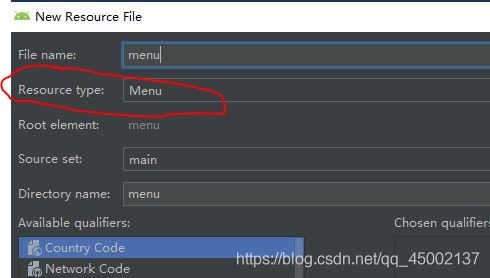Android笔记----导航栏
Android导航栏
** 源码**
Android Studio导入Android项目需要删除的文件
1、.idea文件夹
2、.gradle文件夹
3、所有的build文件夹
4、所有的.iml文件
5、local.properties文件。
废话不多说,直接上代码
java代码
Mainactivity
package com.example.ex04;//修改为自己的包名
import android.os.Bundle;
import android.view.MenuItem;
import androidx.annotation.NonNull;
import androidx.appcompat.app.AppCompatActivity;
import androidx.fragment.app.Fragment;
import androidx.fragment.app.FragmentTransaction;
import com.google.android.material.bottomnavigation.BottomNavigationView;
public class MainActivity extends AppCompatActivity {
private BottomNavigationView navigationView;
//创建四个Fragment和存放他们的数组
private Fragment Fragment1;
private Fragment Fragment2;
private Fragment Fragment3;
private Fragment Fragment4;
public Fragment[] fragmentlist;
//用于标识上一个fragment
private int lastFragment;
@Override
protected void onCreate(Bundle savedInstanceState) {
super.onCreate(savedInstanceState);
setContentView(R.layout.activity_main);
//fragment初始化
initFragment();
}
/**
* 初始化fragment,并将Fragment1显示出来
*/
private void initFragment() {
navigationView = findViewById(R.id.bnv_main);
//配置菜单按钮显示图标
navigationView.setItemIconTintList(null);
//将三个fragment先放在数组里
Fragment1 = new Fragment1();
Fragment2 = new Fragment2();
Fragment3 = new Fragment3();
Fragment4 = new Fragment4();
fragmentlist = new Fragment[]{
Fragment1, Fragment2, Fragment3, Fragment4};
lastFragment = 0;
//为navigationView设置点击事件
navigationView.setOnNavigationItemSelectedListener(mOnNavigationItemSelectedListener);
//设置默认页面为Fragment1
getSupportFragmentManager().beginTransaction().replace(R.id.fl_main, Fragment1)
.show(Fragment1).commit();
navigationView.setSelectedItemId(R.id.navigation_home);
}
/**
* 给BottomNavigationView添加按钮的点击事件
*/
private BottomNavigationView.OnNavigationItemSelectedListener mOnNavigationItemSelectedListener
= new BottomNavigationView.OnNavigationItemSelectedListener() {
@Override
public boolean onNavigationItemSelected(@NonNull MenuItem item) {
//每次点击后都将所有图标重置到默认不选中图片
resetToDefaultIcon();
switch (item.getItemId()) {
case R.id.navigation_home:
//判断要跳转的页面是否是当前页面,若是则不做动作
if (lastFragment != 0) {
switchFragment(lastFragment, 0);
lastFragment = 0;
}
//设置按钮
item.setIcon(R.drawable.homea);
return true;
case R.id.navigation_buy:
if (lastFragment != 1) {
switchFragment(lastFragment, 1);
lastFragment = 1;
}
item.setIcon(R.drawable.shopa);
return true;
case R.id.navigation_user:
if (lastFragment != 2) {
switchFragment(lastFragment, 2);
lastFragment = 2;
}
item.setIcon(R.drawable.usera);
return true;
case R.id.navigation_love:
if (lastFragment != 3) {
switchFragment(lastFragment, 3);
lastFragment = 3;
}
item.setIcon(R.drawable.lovea);
return true;
}
return false;
}
};
/**
* @param lastFragment 表示点击按钮前的页面
* @param index 表示点击按钮对应的页面
*/
private void switchFragment(int lastFragment, int index) {
FragmentTransaction transaction = getSupportFragmentManager().beginTransaction();
//隐藏上个Fragment
transaction.hide(fragmentlist[lastFragment]);
//判断transaction中是否加载过index对应的页面,若没加载过则加载
if (fragmentlist[index].isAdded() == false) {
transaction.add(R.id.fl_main, fragmentlist[index]);
}
//根据角标将fragment显示出来
transaction.show(fragmentlist[index]).commitAllowingStateLoss();
}
/**
* 重新配置每个按钮的图标
*/
private void resetToDefaultIcon() {
navigationView.getMenu().findItem(R.id.navigation_home).setIcon(R.drawable.homeb);
navigationView.getMenu().findItem(R.id.navigation_buy).setIcon(R.drawable.shopb);
navigationView.getMenu().findItem(R.id.navigation_love).setIcon(R.drawable.loveb);
navigationView.getMenu().findItem(R.id.navigation_user).setIcon(R.drawable.userb);
}
}
创建四个布局文件和java文件
Fragment1.java + fragment_head.xml
Fragment2.java + fragment_order.xml
Fragment3.java + fragment_love.xml
Fragment4.java + fragment_user.xml
这里我就贴出来其中的一个,其他Java代码和相应的布局文件都是一样的,修改修改就行了
Fragment1.java
package com.example.ex04;
import android.os.Bundle;
import android.view.LayoutInflater;
import android.view.View;
import android.view.ViewGroup;
import android.widget.TextView;
import androidx.annotation.Nullable;
import androidx.fragment.app.Fragment;
public class Fragment1 extends Fragment {
@Nullable
@Override
public View onCreateView(LayoutInflater inflater, @Nullable ViewGroup container, @Nullable Bundle savedInstanceState) {
//该View表示该碎片的主界面,最后要返回该view
View view=inflater.inflate(R.layout.fragment_head,container,false);
//fragment_head为对应的布局文件
//注意:因为主界面现在是view,所以在找寻控件时要用view.findViewById
TextView textView=view.findViewById(R.id.tv1);
//tv1为对应的布局文件文本框名
return view;
}
}
fragment_head.xml
<ScrollView xmlns:android="http://schemas.android.com/apk/res/android"
xmlns:tools="http://schemas.android.com/tools"
android:layout_width="match_parent"
android:layout_height="match_parent">
<TextView
android:id="@+id/tv1"
android:layout_width="wrap_content"
android:layout_height="wrap_content"
android:layout_centerInParent="true"
android:text="我是首页"
android:textSize="30dp" />
ScrollView >
还有一个activity_main.xml文件
<RelativeLayout xmlns:android="http://schemas.android.com/apk/res/android"
xmlns:tools="http://schemas.android.com/tools"
android:layout_width="match_parent"
android:layout_height="match_parent"
xmlns:app="http://schemas.android.com/apk/res-auto"
android:orientation="vertical"
tools:context="com.example.ex04.MainActivity">
<FrameLayout
android:id="@+id/fl_main"
android:layout_width="match_parent"
android:layout_height="match_parent"
android:layout_above="@id/bnv_main"/>
<com.google.android.material.bottomnavigation.BottomNavigationView
android:id="@+id/bnv_main"
android:layout_width="match_parent"
android:layout_height="wrap_content"
android:layout_alignParentBottom="true"
app:menu="@menu/navigation"/>
RelativeLayout>
在res下新建一个menu文件夹navigation.xml

最后别忘在AndroidManifest.xml里面注册活动,我把相应的代码贴出来仅供参考
<manifest xmlns:android="http://schemas.android.com/apk/res/android"
package="com.example.ex04">
<application
android:allowBackup="true"
android:icon="@mipmap/ic_launcher"
android:label="@string/app_name"
android:roundIcon="@mipmap/ic_launcher_round"
android:supportsRtl="true"
android:theme="@style/AppTheme">
<activity android:name=".MainActivity">
<intent-filter>
<action android:name="android.intent.action.MAIN" />
<category android:name="android.intent.category.LAUNCHER" />
intent-filter>
activity>
<activity android:name=".Fragment1">activity>
<activity android:name=".Fragment2">activity>
<activity android:name=".Fragment3">activity>
<activity android:name=".Fragment4">activity>
application>
manifest>







